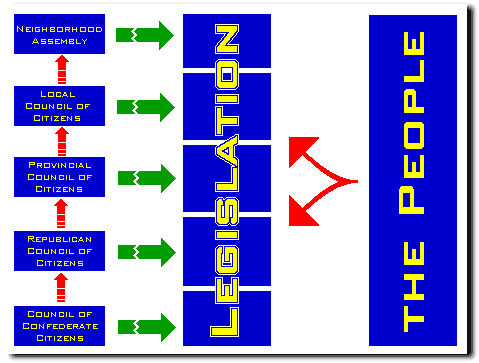| The Free
Confederacy of Lendian Republics is a nation built upon a number of unusual
characteristics, both politically and economically. These characteristics
apply only to the full-righted members of the Confederacy - the Free Republics.
The Dependencies are territories with very small populations and/or low
technological development and are administered from the closest Free Republic.
The Associated States are practically independent nations with their own
political organization, being linked to the Free Confederacy by diplomatic
and defensive bonds only.
Topics:
Political
system

 - Selected from (by statistical methods) - Selected from (by statistical methods)  - Propose - Propose  - Vote electronically - Vote electronically
The Free Confederacy
of Lendian Republics has no government. Power is held by the people and
only by the people. The institution that is closest to a government in
the Free Confederacy is a consultative body, the Council of Confederate
Citizens, composed by a variable number of members, although proportional
to the population of the Free Republics. There is also a small number of
bureaucratic employees and a few diplomats.
The duties
of the Council of Confederate Citizens are limited to propose to
the people of the Confederacy different possible courses of action, to
explain the pros and contras of each of them and to provide
a mechanism of fast reaction when it becomes necessary. The Council
of Confederate Citizens is very plastic in its composition. A Council
member may propose whatever measure he/she considers necessary, but needs
to explain it thoroughly. Council members are selected amongst the most
successful members of the Republican Councils of Citizens, where
success is measured statistically through the percentage of approved proposals
weighted with the total number of proposals. These data are then crossed
between the data of the members of other Republican Councils of Citizens
so that the proportion is not changed. Republican Councils of Citizens
are similar structures at a republican level, and the Provincial and
Local Coucils are similar structures at a province and city level,
respectively. Their members are selected in a similar way, although in
these Councils there are no geographic or demographic restrictions. A member
of a Council remains a member of all the Councils of lower level in his/her
area of residence. The Neighbor Assemblies, are composed by all
the citizens that share a contiguous territory, comprising between 100
to 200 inhabitants. These can encompass a mere building, or even only a
part of a building, in the largest cities or large territories in the areas
of scattered population.
Thus, every
citizen in the Free Confederacy has the right and the duty to play an active
role in the Confederate political life, from local to global level, and
every citizen contributes with his vote to all decisions that will influence
his/her life, one way or the other. To inforce such a large-scale popular
democracy, the people of the Refuge (see Modern History of Lendia),
begun the implementation of a huge network of computers, known today as
the Lendian Computer Network, or LCN. This network is complemented
with another great technological effort, the "Home Effort", a plan
to provide each home inside Confederate territory with its own network
terminal.
Economical
system
Economically,
the Free Confederacy of Lendian Republics is also unusual. Since freedom
in all it's variations is the most important value of the Free Confederacy,
the people of the Confederacy has the freedom to choose their own line
of work and also to work or not. The income of each citizen is determined
by the quality of his work (determined by the collective of the other citizens),
through a process of attribution of points. These points are then transformed
into credits, the currency of the Confederacy. There is a widely
agreed upon system to provide to everybody what is needed for basic survival,
through the donation of a variable percentage of the citizen's income to
a common fund. Part of this fund is distributed among the citizens that
choose not to work, part of it is spent in foreign trade and part of it
goes to maintenance of the global property of the Confederacy (public spaces,
the LCN, aso.).
The citizens
of the Free Confederacy are usually quite fond of all the unusual approaches
to the problems, since after freedom, the greatest value of the Free Confederacy
is imagination. This causes a continuous advancement in science and arts,
turning the Confederacy into one of the greatest powers in the known world.
It also causes that the most credited people are precisely the most imaginative
people, allowing a number of them to prosper only through their imagination.
In recent times,
due to automatization, manual work is getting more and more rare. Despite
that there are still people that prefer to work manually. These citizens
have the option to work in the Confederacy, but are encouraged to emigrate
to the Dependencies, where that kind of work is still very needed and highly
rewarded. This imigration has been causing a fast increase in the population
of the Dependencies, and some of them are close to having the conditions
to become Free Republics in their full right.
|
Table
of currency conversion of the Confederate Credit
|
|
1 Credit
|
3.21 Coceiran Ullies
|
|
1 Credit
|
342 Acarinian Blows
|
|
1 Credit
|
1.1 Dignanian Nuzillans
|
|
1 Credit
|
7.09 Morconian Portos
|
|
1 Credit
|
18 Mosqitian Babas
|
|
1 Credit
|
3.1 Africabluean Défenses
|
|
1 Credit
|
45.57 Mauretanian Douros
|
|
100 Credits
|
4 Jannatani Pahtat
|
|
1 Credit
|
0.4557 Founani Lakeh
|
|
1 Credit
|
4.5 Dalian Montres
|
|
1 Credit
|
0.6254 Libré Grammes
|
|
100 Credits
|
0.3333 Phenixian Briks
|
© 298 Jorge Candeias, webmaster
last update, 22-2-301
|